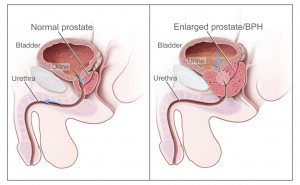Until very recently, the only real treatment for BPH was an operation. If their symptoms are not too bad, most men just need reassurance that their condition is not dangerous, and advice about simple measures such as being sensible about the amount of fluid they drink, taking enough time to empty the bladder and learning to live with what may be only minor symptoms.
Why isn’t treatment always given? There is always a risk of side-effects from any treatment (whether surgery or drugs) and, if the symptoms are mild, the side-effects could be worse than the condition itself.
Research has shown that prostate operations are usually very successful if the patient has been suffering severe symptoms, but many men with only mild symptoms are disappointed with the result.
An operation remains the most effective method of treating BPH. An operation rather than some other type of treatment is essential if the patient has had retention of urine, or obstruction has caused kidney failure. Sometimes the tests will show that the obstruction is so bad that an operation can prevent a complication of this type. If symptoms are very bad, an operation is usually the best way to improve them. Even if the symptoms are milder, when the tests have shown that the prostate is causing bad obstruction, an operation may be the only way of putting things right.
 Compared with some types of surgery, prostate operations are really quite safe. Men with quite serious health problems can have a prostate operation without coming to harm, but an older or less fit man really should be having quite a lot of problems to make an operation advisable.
Compared with some types of surgery, prostate operations are really quite safe. Men with quite serious health problems can have a prostate operation without coming to harm, but an older or less fit man really should be having quite a lot of problems to make an operation advisable.
Whether an operation is necessary often depends very much on how badly the symptoms affect the patient. Unless there is some reason why a prostate operation is essential because of a risk to health (which is unusual), you can expect the urologist to discuss it with you and he may even leave the final choice to you.
If you are to have a TURP you will probably be admitted to hospital the day before. A final physical examination, some blood tests and other tests, including a chest X-ray, will be carried out. The urologist and anaesthetist will discuss the operation with you. You may be given a choice between a general and a spinal anaesthetic, although sometimes, for example if you have a bad chest disease, a general anaesthetic might not be advisable.
